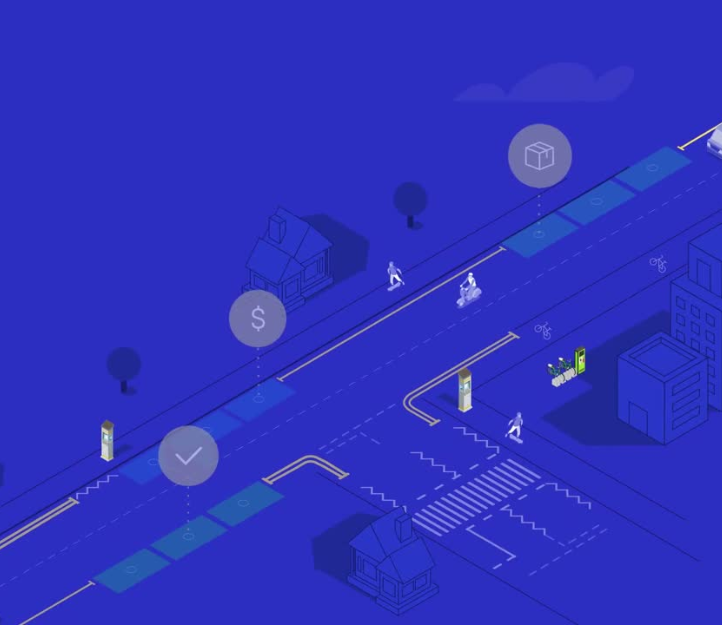Supporting your lone workers in the field means taking advantage of field service management tools that put them on the road to success. Balanced workloads and the likelihood of a first-time fix hold a direct link to the workflows an FSM platform can design for your operations. Dynamic field service scheduling takes data such as geolocation, skills, parts, and training to provide an optimised outcome. It removes pressures from dispatchers and fleet managers and streamlines finance and customer service process.
Field service management also brings operational improvements to lone worker safety and compliance, notably for safety certification in regulated industries (such as home healthcare, working at heights, and gas/electrical orders). Simply put, a dynamic scheduling platform such as FLS VISITOUR will never assign an unqualified lone field operative.
In the last mile of field service, safe vehicle movements, such as parking, is another safety and compliance factor. Adding parking to your responsible, rule-based scheduling can mitigate risk for both the lone worker and the end customer.
Here at AppyWay we have the UK’s largest and most detailed kerbside dataset. With over 500 towns and cities across the UK mapped, our granular kerbside data provides a clear picture of the driver’s end destination, including clear visibility of parking information, loading regulations as well as on-street EV charge points.
“AppyWay has partnered with FLS to add real-time dynamic field scheduling capability and to maximise the benefits of their kerbside dataset. When this data is utilised, organisations see dramatic reductions in parking fines and costs, more accurate ETAs and a critical decrease in job abortion rates.”
Lone worker management in field services
Connected field service management software enhances worker safety in real-time. This is critical when the industry is moving towards the flexibility of 100% lone-worker operations. However, with persistent challenges in recruitment and retention some companies are faced with few choices but to dispatch that single worker. Limiting risk for lone workers focuses on the welfare and security of operatives who work in isolation at any point in shift.
Location data from the field can be an organisation’s key to lone worker safety:
- Begin with risk assessment: Whilst a work order may supply building information modelling and photography, it is for schedulers and dispatchers to conduct a location risk assessment to identify potential hazards. The surroundings, the time of day or night, and the route to access should be included.
FLS’ embedded route and tour planning guides field operatives to exact geolocations, not postcodes. Our technical partner AppyWay supplies the UK’s largest and most accurate kerbside dataset; meaning planners and lone workers alike are supported with critical location intelligence such as where to park safely and legally, parking on well-lit public roads and minimised on-foot distance between the vehicle and the appointment. You may also create rules such as cashless payment options reducing the need for drivers to carry cash on their person.
- Safety meets wellbeing: Providing appropriate safety and personal equipment is as important as mental health. Address factors like fatigue management, stress reduction, and the availability of phone signals for voice check-ins.
FLS VISITOUR route planning and scheduling software mitigates the risks of excessive hours and driver fatigue by proactively addressing them before lone workers begin their shifts. It considers the availability of resources and automatically makes schedule adjustments to optimise their utilisation and efficiency. Combining embedded route planning with AppyWay’s kerbside location services eliminates the need for field staff to cover specific ‘postcode patches’, considers rules around ‘home on time’, and breaks, and beginning shifts from home.
A balanced workload with less driving reduces tiredness. Kerbside location services such as AppyWay’s can also improve driver and customer experiences and reduce instances of parking fines, leading to better supported mental well-being.
- Policies and Procedures: Develop clear and comprehensive policies and procedures specifically addressing lone worker safety. This includes reliable communication devices, such as simple two-way radios or specialist lone worker safety features like GPS tracking, panic buttons, and check-in functions.
FLS VISITOUR connects with both your in-vehicle and lone worker location devices, for a real-time view at head office. The features of FLS MOBILE, for example, include ETA, check-ins, and overrunning appointment alerts, all to the parties of your choice (including on-location site managers). Whilst features power in-day re-optimisation, AppyWay will again supply kerbside location options according to the day’s progress, in line with your safety rules.
- Review and Improvement: Regularly review and evaluate lone worker safety measures to ensure effectiveness. Seek feedback from lone workers and investigate any incidents or near misses to identify areas for improvement.
With FLS MOBILE connected to your CRM, data can be written directly back to the work order. Flags, photos, and comments can be added to completed jobs to inform future scheduling and dispatch. If an improved future route is required, AppyWay will identify and suggest new, appropriate parking options.





